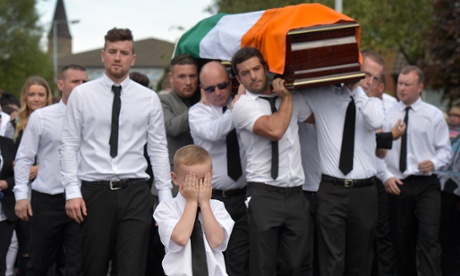There is one thing Tony Blair's former chief of staff, Jonathan Powell, won't be talking about during international peace conference in the Basque country this week: namely, the extent to which all branches of the security forces had successfully penetrated the Provisional IRA even though the terror group was a far more sophisticated and efficient killing machine than Eta.
As Powell recounts his days wooing the republican movement from violence in effort to persuade Eta and its political wing to follow the same path he will not want to disclose how much the British government actually knew about what was going on inside the IRA during the two Provo ceasefires and the runup to political negotiations leading to the Belfast and later the St Andrews agreements.
Because in the passing caravan of peace-process tourism there is normally no mention of the secret war conducted by the state and its impact in convincing republicans they could not win the war.
Rather it is all sweetness and light; testimonies to how "dialogue" and "talking" persuaded the key violent actors in Northern Ireland to reverse out of the "armed struggle" cul-de-sac and into constitutional politics.
During the discussions in San Sebastián there will be lots of references to the example of Northern Ireland as a light unto other nations embroiled in conflict.
In any realistic analysis it is worth examining exactly how deeply even such a professional outfit as the Provisional IRA was infiltrated by the beginning of the 1990s.
The head of the terror group's spy-catching unit – the so-called "Headhunters" – Freddie Scappaticci was in fact himself a British agent.
Codenamed "Stakeknife" the man in charge of hunting down informers in the ranks was one of the biggest informers of all for nearly two decades. Meanwhile, one of Gerry Adams's closest aides in Sinn Féin, a man who had detailed knowledge of the Provisionals' contacts in the Middle East for instance, was Denis Donaldson.
He was later outed as another British spy even though he wielded considerable influence within Sinn Féin. When one considers that Donaldson was used to move against potential future sources of opposition to Adams in, for example Fermanagh/South Tyrone (Donaldson was instrumental in preventing IRA gunrunner Gerry McGeough from getting the nomination to stand in the constituency at a Westminster election), it is clear this agent was an important asset to the British state in its promotion of the peace camp within the republican movement.
Army intelligence whistleblower Ian Hurst, AKA Martin Ingrams, claims that at least one in four PIRA activists by the late 1980s had been compromised or were agents of the state while half of its so-called "officer class" were working for one or more branches of either the British or Irish security forces.
If Hurst is even half right in his assessment it means at the very least that by the time Powell and Blair sat down with leading republicans they had enough intelligence at their disposal to know what the movement's true intentions were let alone the ability to thwart IRA operations on a grand scale.
Indeed some former members of PIRA are even casting doubt now on late "triumphs", such as the break-in at Castlereagh Holding Centre in east Belfast when the Provos gained access to RUC intelligence files.
A republican representative (albeit one with links to the Real IRA) recently told this writer that several IRA members who remained loyal to the Adams/McGuinness leadership during the 1997 split that led to the creation of the dissident terror group now believe the break-in was a "staged operation" by MI5, a sting no less to ensure the security services became the primary agency in handling counter-terrorist intelligence within Northern Ireland.
This record is important because it clearly demonstrates that the secret war played its part in ending the Troubles effectively.
We do not know how far the Spanish state has successfully done the same to Eta although it is beyond debate that a crackdown on the other side of the Pyrenees by the French security forces has been critical in forcing Eta to come to terms with reality.
What is certain too is that the relative success of the Irish peace process is due to a combination of factors, of which undoubtedly the need for dialogue and talking played a part.
But there was another form of verbal communication running in parallel with secret talks and Hume-Adams talks in the years running up to the ceasefires. Most of it was one-way traffic. Almost all of it coming from paid sources within the terror groups to the security organs of the British and Irish states.
It is highly unlikely that channel will get any airing in San Sebastián this week. Which might be just as well as it might be a source of some embarrassment for some of the key players in the political process.








